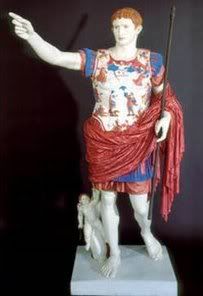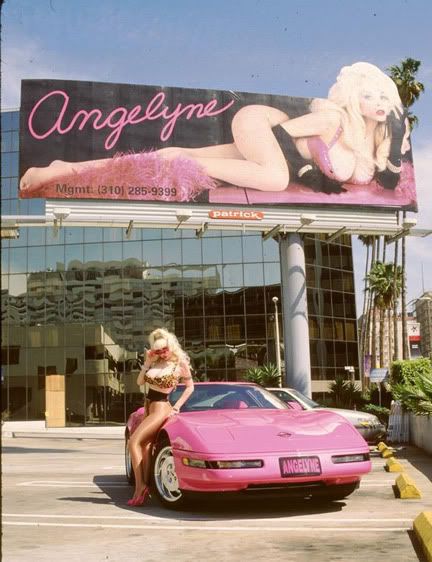Gayscape Goes to Camp Part 1
In a neighborhood near me growing up, there was an unassuming suburban home with a particular feature that gave people the chills, or maybe just made them want to puke. In front of this standard one story Orange County home was a series of Greco-Roman statues standing atop pillars on the homeowner’s front lawn. If that alone wasn’t tacky enough, parts of the statues were painted with bright neon colors. These statues stood in front of this home for many, many years. The people I knew who lived near it were ashamed and emberassed, but I each time we drove by I got a special thrill out of seeing them in all their glory, a flagrant “fuck you” to the entire neighborhood. I never found out who lived in that house, but I always wanted to know. But I knew, even as a child, that whoever owned that home simply had no idea how horrible their taste was, and that made me chuckle to myself every single time I passed it by. I soon discovered that the other gay kids at school (well, gay acting kids. It’s not like we were out n’ proud in Jr. High) had a special reverance for this particular house. That’s when I realized that “our” humor does not always jive with “their” humor. It’s when I discovered what camp was, beyond its definition as “that place one lives in while in the woods.”

I might get into some trouble for saying this, but the truth is different racial, poilitical, socio economic and age groups, more often than not, have very, very different senses of humor. Am I generalizing? Well, yes I am. There are always exceptions to every rulek of course, but it’s a truth we all know. No one expects to see a group of middle aged women at an American Pie movie, or a group of teenagers at the latest Woody Allen rom com, or a lot of white people at the latest Tyler Perry opus. Action, Drama, Horror, these kinds of genres can and do cross all kinds of racial, age and economic lines, but nothing is quite as group specific as comedy. In short, we don’t all laugh at the same shit, and gay people are no exception to this rule.
Nothing gets gay men rolling in the aisles like camp humor. There’s all kinds of camp of course, and by no means do you have to be gay to “get it”, but for some reason we respond to the notion of “so bad it’s good” more than any other category of humans. The dictionary describes camp as “something that provides sophisticated, knowing amusement, as by virtue of its being artlessly mannered or stylized, self-consciously artificial and extravagant, or teasingly ingenuous and sentimental.” In other words, there are two kinds of camp: Intentional and unintentional. Why we as gay men love camp humor so much is almost impossible to explain. I feel like it’s in my DNA almost. Of course, there is a brand of camp that’s loved by straight people too. I mean, who doesn’t love the wretched excess of an Ed Wood movie? And the Geekscape Gauntlet is built around the notion of straight boy camp humor, with unintentonally campy movies with lots of guns and kicking that look like they cost $5 to film at your local nature center. But for the purposes of this article, I’m going to focus on the campy stuff that gay people love, since more often than not camp humor is what defines our humor.
Unintentional Camp
More often than not, unintentional camp is the better of the two. When someone tries so hard to make something respectable only to have it backfire in their face in such a spectacular way, well….that is always entertaining. Not all camp that’s unintentional is bad in any kind of traditional way, however. Almost all old Hollywood Classics from the Golden Era are campy in some respects by today’s standards, since the acting style back then was so theatrical and stagey all across the board. We kind of give movies from this era a pass, but not to acknowledge their campier aspects today is missing half the fun. And I think for some of the depression era classics, they only have an audience today because their are still a handful of gay men who lap up every over the top line delivery given by Bette Davis or Gloria Swanson when one of those old flicks shows up late at night on AMC.
Another great camp tradition are educational films from the 1950’s and 60’s. Meant to teach children and teens the perils of getting your first period, not wanting boys to think you’re a “loose girl”, or teaching young boys to beware of “the homosexual”, educational films are delivered with a ridiculous earnestness that makes one howl in laughter each time. So much of tv is campy by definition, but one man took the cake: Aaron Spelling. In the 70’s and 80’s. producer Aaron Spelling was the king of unintentionally campy television shows. America lapped up shows like Charlie’s Angels, Fantasy Island, and Dynasty, with bad writing, over the top acting, and ridiculous fashion and hair. But the gay community loved them not in spite of their cheesiness, but because of it.
Then there’s the movies. While the world of low-budget action, horror, and sci-fi camp has always yielded its own brand of camp, it is the big budgeted, earnest epic failures that the gay community has embraced as their own. I speak now of the Mommie Dearests, the Xanadus and the Showgirls of this world, movies with high ambitions and lofty goals, which then fail in their own spectacular way. The sheer awfulness of these films attracts us as much as it seems to repel everyone else, and maybe that’s their special appeal. To everyone else, their failure is just that: merely failure, but to us it’s art. Hilarious, accidental art.
![]()
Intentional Camp
Of course, some things are intentionally campy and great. The original 1960’s Batman television series starring Adam West and Burt Ward (not to mention gay icons Julie Newmar and the late, great Eartha Kitt as Catwoman) is probably the first intentionally campy mega success in American culture. Comics fans all over the world hate the series for mocking their beloved Dark Knight. Truth is, Batman for much of the 50’s and early 60’s was a very, very silly comic that was ripe for being made fun of. “Dark” was the last thing it was. My own relaionship to the show is probably familiar to many; as a child with no taste developed and no sense of irony yet, I took the whole thing on face value. As a pre-teen I hated the show for making fun of Batman and giving comics a bad name, and as a teenager and adult I finally realized it was a brilliant parody and came right back to loving it. In the 80’s, celelbrities like Elvira, Mistress of the Dark and Pee Wee Herman became instant Icons of gay camp humor . Don’t think Pee Wee counts as gay camp? Watch the Pee Wee’s Playhouse Christmas Special again; it features such special guest stars as Cher, Grace Jones, Charo and The Naval Mens Choir. Then you tell me Pee Wee doen’t count. It’s required annual holiday viewing in my home.
![]()
Last but not least, there’s the Drag Queens. Long staples of gay culture, drag is the very definition of camp humor: Ridiculous over the top excess just for the sake of it. We love our drag queens with a special fervor others reserve for Presidents and royalty. In a weird way, people like RuPaul and Boy George are our royalty (well, old Boy George is kind of fallen royalty at the moment). While drag is usually men dressing up as women in an over the top fashion, the truth is drag can mean any overly exaggerated version of femininity, even if it’s an actual woman. One of my favorite drag personas is a woman named Angelyne, the Billboard Queen. A big breasted Barbie doll come to life, Angelyne has long been a Los Angeles area staple, driving around Hollywood in her hot pink Corvette, buying up billboards all around town merely to advertise her own glamourous existence and nothing else. Angelyne is the very definition of a campy drag queen, and as far as I can tell, she’s a real woman. Hell, even Cher and Madonna can attribute so much of their appeal to their gay fans as being female drag queens too.

And speaking of drag, I can’t not mention the late Divine. But I’ll get to her next week in detail, when I do part 2 of the Camp-tastic series, all about John Waters, the King of Camp.
